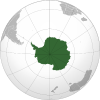Dirck Gerritsz Laboratory

History
In 2010 the Dutch Ministry of Education, Culture and Science gathered 6 million euros for research on climate change in Antarctica. The Dutch Research Council and the Royal Netherlands Institute for Sea Research began to design the laboratory. The station was officially opened on 27 January 2013.
The facility is named after Dutch explorer Dirck Gerritsz Pomp, who allegedly holds a claim as the first to sight islands off the Antarctic continent during an expedition from Europe to East Asia in 1599. The four mobile laboratories carry the names of the four ships, Hoop (Hope), Liefde (Love), Blijde Boodschap (Annunciation) and Geloof (Belief).
Structure
The laboratory consists of four 20 TEU standard containers that were modified to be scientific laboratories. They are docked inside a custom made shed. In 2017-2021 the four labs were brought to Royal Netherlands Institute for Sea Research on Texel one by one for modifications and partial refurbishment. One of the containers labs subsequently was aboard the icebreaker RV Polarstern of the Alfred Wegener Institute for Polar and Marine Research during the MOSAiC Expedition in 2019/2020, before it was returned aboard the RRS Sir David Attenborough to Rothera research station. The laboratories could be sealifted to other Antarctic or Arctic stations as well.
References
- ^ Antarctic Station Catalogue (PDF) (catalogue). Council of Managers of National Antarctic Programs. August 2017. p. 91. ISBN 978-0-473-40409-3. Archived (PDF) from the original on 22 October 2022. Retrieved 16 January 2023.
- ^ www.waponline.it Retrieved February 5, 2021
- ^ "The Dirck Gerritsz Laboratory | NWO". www.nwo.nl. Retrieved 2021-06-17.
- ^ "Dirck Gerritsz Laboratory | Antarctica Attractions". www.lonelyplanet.com. Retrieved February 5, 2021.
- ^ www.nwo.nl Retrieved February 5, 2021
